初中英语八大时态全套精讲及练习题
- 格式:doc
- 大小:101.00 KB
- 文档页数:24
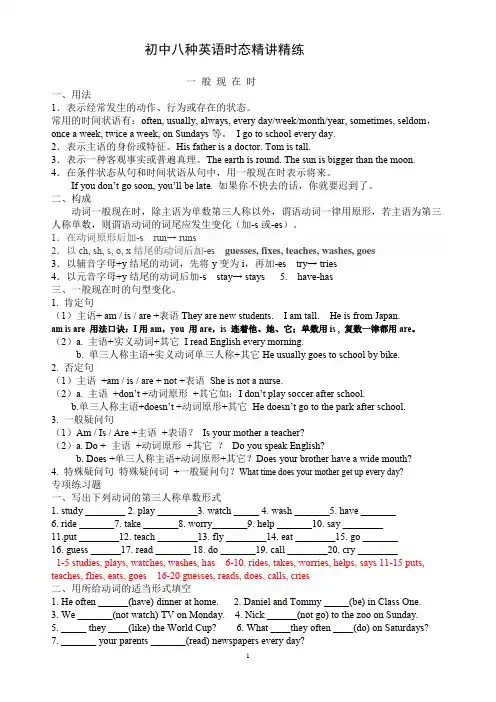
初中八种英语时态精讲精练一般现在时一、用法1.表示经常发生的动作、行为或存在的状态。
常用的时间状语有:often, usually, always, every day/week/month/year, sometimes, seldom,once a week, twice a week, on Sundays等。
I go to school every day.2.表示主语的身份或特征。
His father is a doctor. Tom is tall.3.表示一种客观事实或普遍真理。
The earth is round. The sun is bigger than the moon. 4.在条件状态从句和时间状语从句中,用一般现在时表示将来。
If you don’t go soon, you’ll be late. 如果你不快去的话,你就要迟到了。
二、构成动词一般现在时,除主语为单数第三人称以外,谓语动词一律用原形,若主语为第三人称单数,则谓语动词的词尾应发生变化(加-s或-es)。
1.在动词原形后加-s run→ runs2.以ch, sh, s, o, x结尾的动词后加-es guesses, fixes, teaches, washes, goes3.以辅音字母+y结尾的动词,先将y变为i,再加-es try→ tries4.以元音字母+y结尾的动词后加-s stay→ stays 5. have-has三、一般现在时的句型变化。
1. 肯定句(1)主语+ am / is / are +表语They are new students. I am tall. He is from Japan.am is are 用法口诀:I用am,you 用are,is 连着他、她、它;单数用is , 复数一律都用are。
(2)a. 主语+实义动词+其它I read English every morning.b. 单三人称主语+实义动词单三人称+其它He usually goes to school by bike.2. 否定句(1)主语+am / is / are + not +表语She is not a nurse.(2)a. 主语+don’t +动词原形+其它如:I don’t pla y soccer after school.b.单三人称主语+doesn’t +动词原形+其它He doesn’t go to the park after school.3. 一般疑问句(1)Am / Is / Are +主语+表语?Is your mother a teacher?(2)a. Do + 主语+动词原形+其它?Do you speak English?b. Does +单三人称主语+动词原形+其它?Does your brother have a wide mouth?4. 特殊疑问句特殊疑问词+一般疑问句?What time does your mother get up every day?专项练习题一、写出下列动词的第三人称单数形式1. study ________2. play ________3. watch _____4. wash _______5. have _______6. ride _______7. take _______8. worry_______9. help _______10. say ________11.put ________12. teach ________13. fly ________14. eat ________15. go _______16. guess ______17. read _______ 18. do _______19. call ________20. cry ________1-5 studies, plays, watches, washes, has 6-10. rides, takes, worries, helps, says 11-15 puts, teaches, flies, eats, goes 16-20 guesses, reads, does, calls, cries二、用所给动词的适当形式填空1. He often ______(have) dinner at home.2. Daniel and Tommy _____(be) in Class One.3. We _______(not watch) TV on Monday.4. Nick ______(not go) to the zoo on Sunday.5. _____ they ____(like) the World Cup?6. What ____they often ____(do) on Saturdays?7. _______ your parents _______(read) newspapers every day?8. The girl _______(teach) us English on Sundays.9. She and I ________(take) a walk together every evening.10. The moon ________ (travel) round the earth.11. It usually ________ (take) me more than two hours to finish my homework.12. I will tell him the good news as soon as he ________ (come) back.13. Miss Gao is very busy. She ________ (sleep) six hours a day.14. Look! Susan ________ (dance) in the garden. She often ________ (dance) there.15. The children will go to the Summer Palace if it ________ (not rain) tomorrow.16. I _________ any pears (not have). But Mary _________ some (have).17. What language ____ you _____? (speak) 18. My brother _____ to be a scientist. (not like) 19. We ______ Japanese at school. (not study) 20. He _____ playing football. (not like)1. has2. are3. don’t have4. doesn’t go5. Do like6. do, do7. Do, read8. teaches9. take 10. travels 11. takes 12. comes 13. sleeps 14. is dancing, dances 15. doesn’t rain 16. don’t have, has 17. do, speak 18. doesn’t like 19. don’t study 20. doesn’t like三、按照要求改写句子1. Daniel watches TV every evening.(改为否定句)_________________________2. I do my homework every day.(改为一般疑问句,并作肯、否定回答)________________________________________________________3. Amy likes playing computer games.(改为一般疑问句,并作肯、否定回答)___________________________________________________4. We go to school every morning.(改为否定句)____________________________5. Sun Yang usually washes some clothes on Saturday.否定句: _____________ 一般疑问句: ________________ 划线提问: ____________6. Tom does his homework at home.否定句: ______________ 一般疑问句: ____________ 划线提问_____________1. Daniel doesn’t watch TV every evening.2. Do you do your homework every day? Yes, I do. No, I don’t.3. Does Amy like playing computer games? Yes, she does. No, she doesn’t.4. We don’t go to school every morning.5. Sun Yang doesn’t usually wash any clothes on Saturday. Does Sun Yang usually wash any clothes on Saturday? What does Sun Yang usually do on Saturday?6. Tom doesn’t do his homework at home. Does Tom do his homework at home? Where does Tom do his homework?四、选用所给的词语适当形式填空give, rain, enjoy, sing, return, borrow, keep1. It often ______ in my hometown in summer.2. Sometimes the birds _______ in the tree.3. Joe usually ____ books from the school library, but she never _____ them on time.4. May I ________ the dictionary for a week?5. The little boy ________ himself in the garden on Saturdays.6. Mary is a good girl. She often ________ me a hand when I need some help.1. rains2. sing3. borrows, returns4. keep5. enjoys6. gives一般过去时的用法一、定义:表示过去某一时间所发生的动作或存在的状态;表示在过去一段时间内,经常性或习惯性的动作。
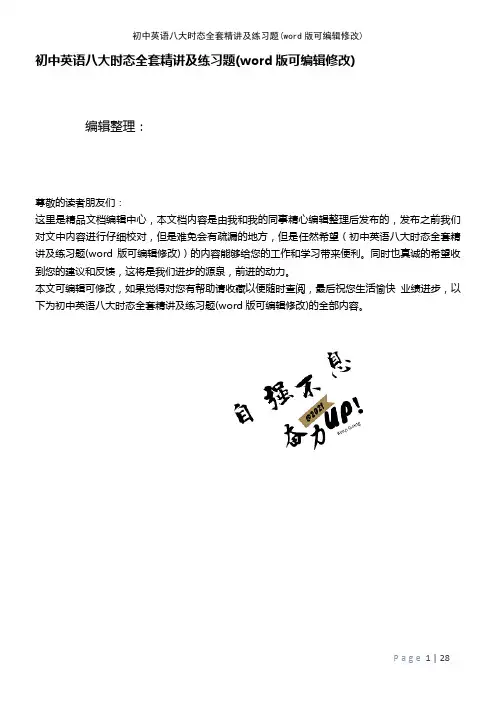
初中英语八大时态全套精讲及练习题(word版可编辑修改)编辑整理:尊敬的读者朋友们:这里是精品文档编辑中心,本文档内容是由我和我的同事精心编辑整理后发布的,发布之前我们对文中内容进行仔细校对,但是难免会有疏漏的地方,但是任然希望(初中英语八大时态全套精讲及练习题(word版可编辑修改))的内容能够给您的工作和学习带来便利。
同时也真诚的希望收到您的建议和反馈,这将是我们进步的源泉,前进的动力。
本文可编辑可修改,如果觉得对您有帮助请收藏以便随时查阅,最后祝您生活愉快业绩进步,以下为初中英语八大时态全套精讲及练习题(word版可编辑修改)的全部内容。
初中英语八大时态全套精讲及练习题.1 一般现在时的用法1)经常性或习惯性的动作,常与表示频度的时间状语连用。
时间状语: every…, sometimes,ofen,always,usually, twice a week, at…, on Sunday I leave home for school at 7 everymorning。
He watches Tv once a week 。
2) 客观真理,客观存在,科学事实.The earth moves around the sun。
Shanghai lies in the east of China.3)表示格言或警句中。
Pride goes before a fall。
骄者必败。
注意:此用法如果出现在宾语从句中,即使主句是过去时,从句谓语也要用一般现在时。
例:Columbus proved that the earth is round。
.4) 现在时刻的状态、能力、性格、个性.I don't want so much.Ann Wang writes good English but does not speak well。
比较:Now I put the sugar in the cup.I am doing my homework now。
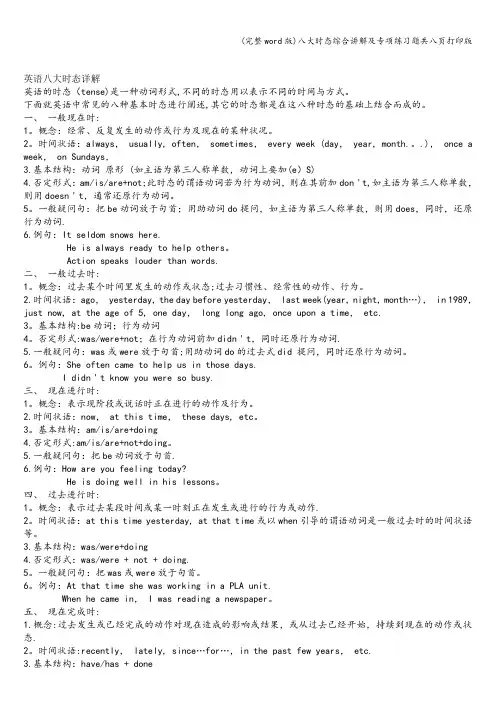
英语八大时态详解英语的时态(tense)是一种动词形式,不同的时态用以表示不同的时间与方式。
下面就英语中常见的八种基本时态进行阐述,其它的时态都是在这八种时态的基础上结合而成的。
一、一般现在时:1。
概念:经常、反复发生的动作或行为及现在的某种状况。
2。
时间状语:always, usually, often, sometimes, every week (day, year, month.。
.), once a week, on Sundays,3.基本结构:动词原形 (如主语为第三人称单数,动词上要加(e)S)4.否定形式:am/is/are+not;此时态的谓语动词若为行为动词,则在其前加don't,如主语为第三人称单数,则用doesn't,通常还原行为动词。
5。
一般疑问句:把be动词放于句首;用助动词do提问,如主语为第三人称单数,则用does,同时,还原行为动词.6.例句:It seldom snows here.He is always ready to help others。
Action speaks louder than words.二、一般过去时:1。
概念:过去某个时间里发生的动作或状态;过去习惯性、经常性的动作、行为。
2.时间状语:ago, yesterday, the day before yesterday, last week(year, night, month…), in 1989,just now, at the age of 5, one day, long long ago, once upon a time, etc.3。
基本结构:be动词;行为动词4。
否定形式:was/were+not;在行为动词前加didn't,同时还原行为动词.5.一般疑问句:was或were放于句首;用助动词do的过去式did 提问,同时还原行为动词。
6。
例句:She often came to help us in those days.I didn't know you were so busy.三、现在进行时:1。
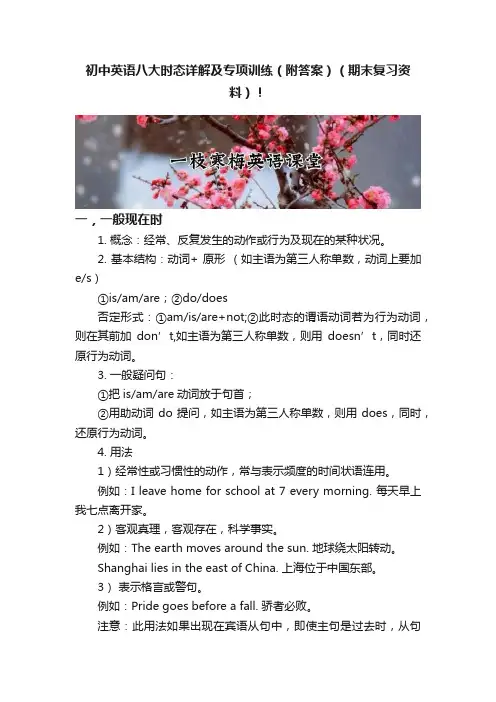
初中英语八大时态详解及专项训练(附答案)(期末复习资料)!一,一般现在时1. 概念:经常、反复发生的动作或行为及现在的某种状况。
2. 基本结构:动词+ 原形(如主语为第三人称单数,动词上要加e/s)①is/am/are;②do/does否定形式:①am/is/are+not;②此时态的谓语动词若为行为动词,则在其前加don’t,如主语为第三人称单数,则用doesn’t,同时还原行为动词。
3. 一般疑问句:①把is/am/are动词放于句首;②用助动词do提问,如主语为第三人称单数,则用does,同时,还原行为动词。
4. 用法1)经常性或习惯性的动作,常与表示频度的时间状语连用。
例如:I leave home for school at 7 every morning. 每天早上我七点离开家。
2)客观真理,客观存在,科学事实。
例如:The earth moves around the sun. 地球绕太阳转动。
Shanghai lies in the east of China. 上海位于中国东部。
3)表示格言或警句。
例如:Pride goes before a fall. 骄者必败。
注意:此用法如果出现在宾语从句中,即使主句是过去时,从句谓语也要用一般现在时。
例如:Columbus proved that the earth is round. 哥伦布证实了地球是圆的。
4)现在时刻的状态、能力、性格、个性。
例如:I don't want so much. 我不要那么多。
He writes good English but does not speak well.他英语写得不错,讲的可不行。
5)一般现在时表示将来含义。
a. 下列动词come, go, arrive, leave, start, begin, return的一般现在时可以表示将来,主要用来表示在时间上已确定或安排好的事情。
例如:The train leaves at six tomorrow morning. 火车明天上午六点开。
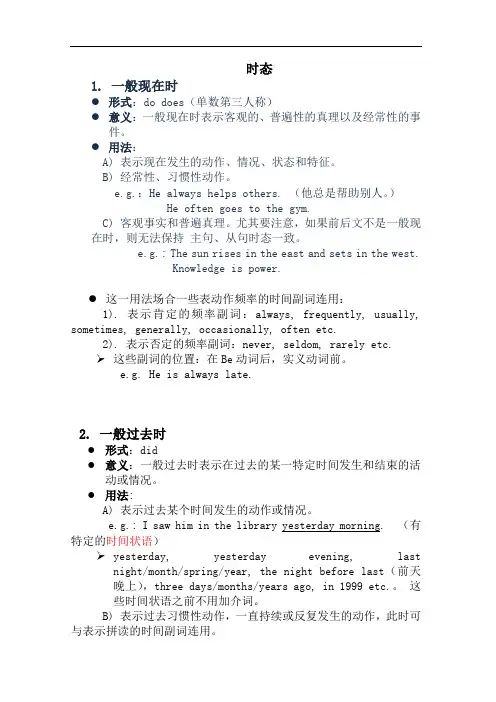
时态1. 一般现在时●形式:do does(单数第三人称)●意义:一般现在时表示客观的、普遍性的真理以及经常性的事件。
●用法:A) 表示现在发生的动作、情况、状态和特征。
B) 经常性、习惯性动作。
e.g.:He always helps others. (他总是帮助别人。
)He often goes to the gym.C) 客观事实和普遍真理。
尤其要注意,如果前后文不是一般现在时,则无法保持主句、从句时态一致。
e.g.: The sun rises in the east and sets in the west.Knowledge is power.●这一用法场合一些表动作频率的时间副词连用:1). 表示肯定的频率副词:always, frequently, usually, sometimes, generally, occasionally, often etc.2). 表示否定的频率副词:never, seldom, rarely etc.➢这些副词的位置:在Be动词后,实义动词前。
e.g. He is always late.2. 一般过去时●形式:did●意义:一般过去时表示在过去的某一特定时间发生和结束的活动或情况。
●用法:A) 表示过去某个时间发生的动作或情况。
e.g.: I saw him in the library yesterday morning. (有特定的时间状语)➢yesterday, yesterday evening, last night/month/spring/year, the night before last(前天晚上),three days/months/years ago, in 1999 etc.。
这些时间状语之前不用加介词。
B) 表示过去习惯性动作,一直持续或反复发生的动作,此时可与表示拼读的时间副词连用。
e.g.: I slept for eight hours last night. (表示在过去某一段时间内持续的动作,但这动作现在已经结束了)3. 一般将来时●形式:will/shall do或be going to do●意义:一般将来时表示在未来的某个时间将要发生的某个动作或状态。
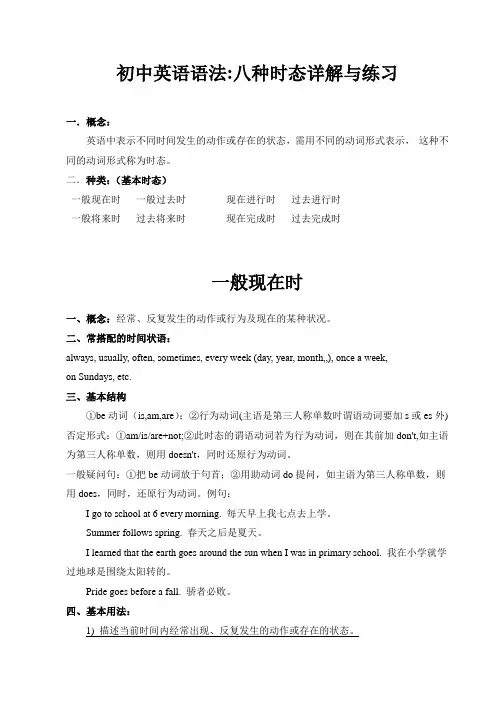
初中英语语法:八种时态详解与练习一.概念:英语中表示不同时间发生的动作或存在的状态,需用不同的动词形式表示,这种不同的动词形式称为时态。
二.种类:(基本时态)一般现在时一般过去时现在进行时过去进行时一般将来时过去将来时现在完成时过去完成时一般现在时一、概念:经常、反复发生的动作或行为及现在的某种状况。
二、常搭配的时间状语:always, usually, often, sometimes, every week (day, year, month…), once a week,on Sundays, etc.三、基本结构①be动词(is,am,are);②行为动词(主语是第三人称单数时谓语动词要加s或es外) 否定形式:①am/is/are+not;②此时态的谓语动词若为行为动词,则在其前加don't,如主语为第三人称单数,则用doesn't,同时还原行为动词。
一般疑问句:①把be动词放于句首;②用助动词do提问,如主语为第三人称单数,则用does,同时,还原行为动词。
例句:I go to school at 6 every morning. 每天早上我七点去上学。
Summer follows spring. 春天之后是夏天。
I learned that the earth goes around the sun when I was in primary school. 我在小学就学过地球是围绕太阳转的。
Pride goes before a fall. 骄者必败。
四、基本用法:1) 描述当前时间内经常出现、反复发生的动作或存在的状态。
在这种情景中,句子常带有表示频率的时间状语:always , everyday , often , once a week (month , year , etc.) , sometimes , seldom , usually等等,以表示句中的动作或状态是习惯性的、经常性的。

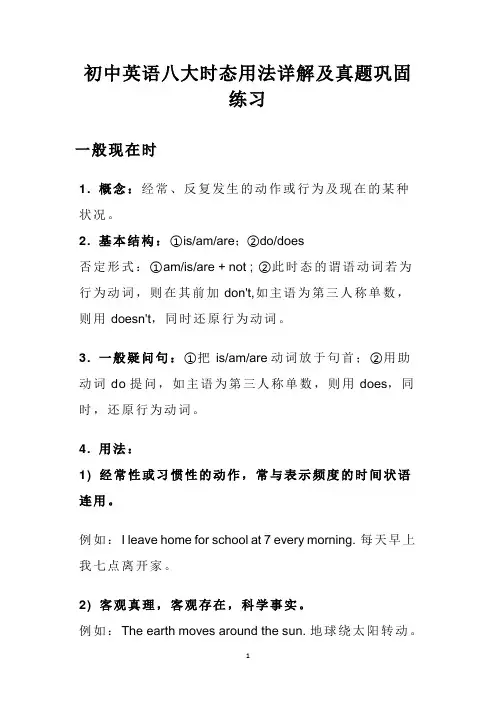
初中英语八大时态用法详解及真题巩固练习一般现在时1. 概念:经常、反复发生的动作或行为及现在的某种状况。
2. 基本结构:①is/am/are;②do/does否定形式:①am/is/are + not ; ②此时态的谓语动词若为行为动词,则在其前加don't,如主语为第三人称单数,则用doesn't,同时还原行为动词。
3. 一般疑问句:①把 is/am/are 动词放于句首;②用助动词do提问,如主语为第三人称单数,则用does,同时,还原行为动词。
4. 用法:1) 经常性或习惯性的动作,常与表示频度的时间状语连用。
例如:I leave home for school at 7 every morning. 每天早上我七点离开家。
2) 客观真理,客观存在,科学事实。
例如:The earth moves around the sun. 地球绕太阳转动。
Shanghai lies in the east of China. 上海位于中国东部。
3) 表示格言或警句。
例如:Pride goes before a fall. 骄者必败。
注意:此用法如果出现在宾语从句中,即使主句是过去时,从句谓语也要用一般现在时。
例如:I knew that the earth goes around the sun when I was little.我小时候就知道地球绕太阳转。
4) 现在时刻的状态、能力、性格、个性。
例如:I don't want so much. 我不要那么多。
Ann writes good English but does not speak well.安英语写得不错,讲的可不行。
5) 一般现在时表示将来含义a. 下列动词 come, go, arrive, leave, start, begin, return 的一般现在时可以表示将来,主要用来表示在时间上已确定或安排好的事情。
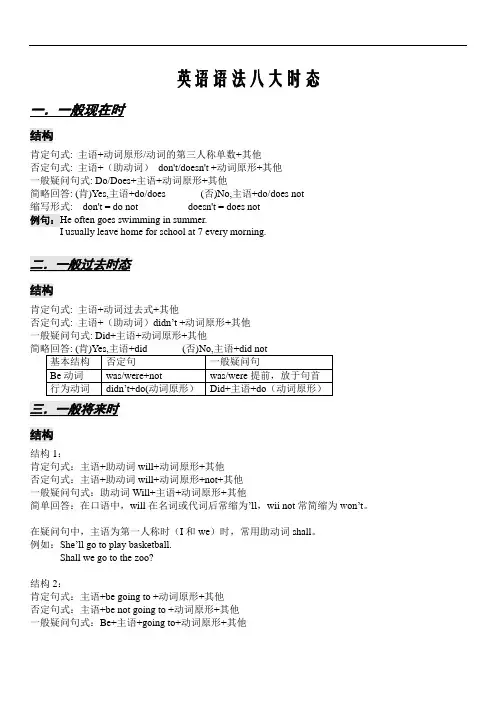
英语语法八大时态一.一般现在时结构肯定句式: 主语+动词原形/动词的第三人称单数+其他否定句式: 主语+(助动词)don't/doesn't +动词原形+其他一般疑问句式: Do/Does+主语+动词原形+其他简略回答: (肯)Yes,主语+do/does (否)No,主语+do/does not缩写形式: don't = do not doesn't = does not例句:He often goes swimming in summer.I usually leave home for school at 7 every morning.二.一般过去时态结构肯定句式: 主语+动词过去式+其他否定句式: 主语+(助动词)didn’t +动词原形+其他一般疑问句式: Did+主语+动词原形+其他基本结构否定句一般疑问句Be动词was/were+not was/were提前,放于句首行为动词didn’t+do(动词原形)Did+主语+do(动词原形)三.一般将来时结构结构1:肯定句式:主语+助动词will+动词原形+其他否定句式:主语+助动词will+动词原形+not+其他一般疑问句式:助动词Will+主语+动词原形+其他简单回答:在口语中,will在名词或代词后常缩为’ll,wii not常简缩为won’t。
在疑问句中,主语为第一人称时(I和we)时,常用助动词shall。
例如:She’ll go to play basketball.Shall we go to the zoo?结构2:肯定句式:主语+be going to +动词原形+其他否定句式:主语+be not going to +动词原形+其他一般疑问句式:Be+主语+going to+动词原形+其他简略回答:(肯)Yes,主语+be (否)No,主语+be not将来时其他表示法1)be going to表示将来表示说话人的打算、计划、安排或根据迹象判断必然或很可能发生的事情。
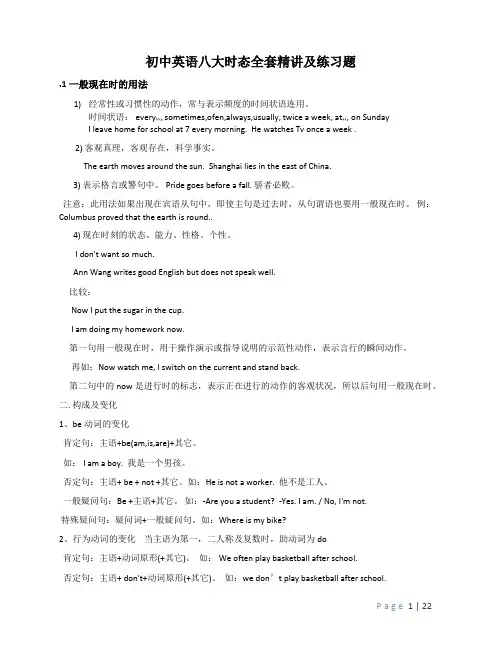
初中英语八大时态全套精讲及练习题.1 一般现在时的用法1)经常性或习惯性的动作,常与表示频度的时间状语连用。
时间状语: every…, sometimes,ofen,always,usually, twice a week, at…, on SundayI leave home for school at 7 every morning. He watches Tv once a week .2) 客观真理,客观存在,科学事实。
The earth moves around the sun. Shanghai lies in the east of China.3) 表示格言或警句中。
Pride goes before a fall. 骄者必败。
注意:此用法如果出现在宾语从句中,即使主句是过去时,从句谓语也要用一般现在时。
例:Columbus proved that the earth is round..4) 现在时刻的状态、能力、性格、个性。
I don't want so much.Ann Wang writes good English but does not speak well.比较:Now I put the sugar in the cup.I am doing my homework now.第一句用一般现在时,用于操作演示或指导说明的示范性动作,表示言行的瞬间动作。
再如:Now watch me, I switch on the current and stand back.第二句中的now是进行时的标志,表示正在进行的动作的客观状况,所以后句用一般现在时。
二. 构成及变化1、be动词的变化肯定句:主语+be(am,is,are)+其它。
如: I am a boy. 我是一个男孩。
否定句:主语+ be + not +其它。
如:He is not a worker. 他不是工人。
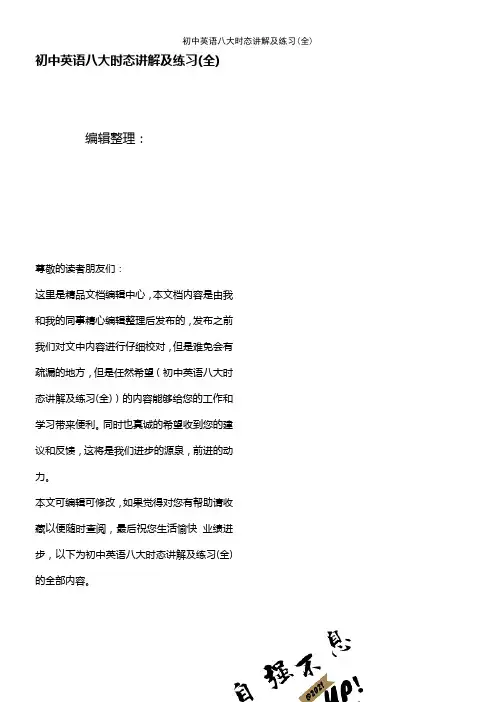
初中英语八大时态讲解及练习(全)初中英语八大时态讲解及练习(全)编辑整理:尊敬的读者朋友们:这里是精品文档编辑中心,本文档内容是由我和我的同事精心编辑整理后发布的,发布之前我们对文中内容进行仔细校对,但是难免会有疏漏的地方,但是任然希望(初中英语八大时态讲解及练习(全))的内容能够给您的工作和学习带来便利。
同时也真诚的希望收到您的建议和反馈,这将是我们进步的源泉,前进的动力。
本文可编辑可修改,如果觉得对您有帮助请收藏以便随时查阅,最后祝您生活愉快业绩进步,以下为初中英语八大时态讲解及练习(全)的全部内容。
一、一般现在时:概念:经常、反复发生的动作或行为及现在的某种状况。
时间状语:always, usually, often, sometimes, every week (day, year, month…), once a week, on Sundays, etc。
基本结构:①be动词;②行为动词否定形式:①am/is/are+not;②此时态的谓语动词若为行为动词,则在其前加don’t,如主语为第三人称单数,则用doesn’t,同时还原行为动词。
一般疑问句:①把be动词放于句首;②用助动词do提问,如主语为第三人称单数,则用does,同时,还原行为动词。
在一般现在时中,当主语是第三人称单数时,谓语动词要用第三人称单数形式,即常在动词原形后加-s或—es。
一、人称代词he, she, it是第三人称单数。
如:He likes watching TV. 他喜欢看电视。
She has lunch at twelve。
她十二点吃午餐.It looks like a cat. 它看起来像只猫.(口诀:I用am,you用are,is用于她他它,单数名词用is,复数名词都用are)二、单个人名、地名或称呼作主语;是第三人称单数。
如:①Han Mei looks like her mother。
韩梅看起来像她的母亲。
初中英语8 种时态分类练习1.一般过去2.一般现在。
现在进行 4 一般将来5 过去进行6 现在完成7 过去完成8 过去将来一般过去时专练( )1. The mother asked the boy down the ladder, but he went on instead.A. come; climbingB. to come; to climbC. to come; climbingD. coming; climbing( )2. The teacher asked the students to close the windows the wind from the papers away.A. to stop; blowingB. stopping; blowingC. to stop; blowD. stopped; blow( )3. The sick man stayed in bed, very terrible.A. feltB. feelingC. is feelingD. was feeling( )4. Yesterday I heard a story by my friend.A. toldB. tellingC. to tellD. tell( )5. The boy was made there for an hour by his father.A. standingB. standC. to standD. stands( )6. I saw him into the small store.A. wentB. goingC. to goD. has gone( )7. He raised his voice to make everybody in the room him clearly.A. hearB. to hearC. hearingD. heard( )8. Our geography teacher told us yesterday that the earth around the sun.A. was movingB. movedC. has movedD. moves( )9. Oh, it’s you. I’m sorry I know you here.A. don’t; areB. didn’t; areC. didn’t; wereD. don’t; were( )10. Mr LuXun died in 1936. He a lot of famous novels.A. wroteB. was writingC. has writtenD. would write( )11. --- How was your weekend on the farm?--- Great! We with the farmers.A. enjoy ourselvesB. went fishingC. will workD. make friends( )12. --- What did Mr Jones do before he moved here?--- He a city bus for over twenty-five years.A. is drivingB. droveC. has drivenD. drives( )13. Jane a new dress every month when she was in Shanghai.A. buysB. is buyingC. boughtD. will buy( )14. --- Liu Mei can’t come tonight.--- Why? But she me she would come.A. tellsB. toldC. is toldD. had told( )15. He turned off the light and then .A. leavesB. has leftC. will leaveD. left一般过去时专练1-5CABAC 6-10 BADCA 11-15 BBCBD一般现在时与现在进行时专练( ) 1. Father usually his newspaper after dinner.A. readB. readsC. readingD. is reading( ) 2. The Blacks often to the cinema on Saturday evenings.A. goB. goesC. is goingD. are going( ) 3.Look! The boy with his mother in the pool.A. is swimmingB. is swimmingC. are swimmingD. are swiming( ) 4.--- What is Tom doing in the classroom? --- He something on the blackboard.A. drawsB. drawC. is drawingD. are drawing.( ) 5.Old Tom usually up at six and sports in the garden.A. gets, dosB. gets, doesC. get, doesD. gets, do( ) 6. It’s ten o’c lock and Jack still(仍然) his homework.A. is, doB. is, doingC. are, doD. are, doing( ) 7. The waiters to work at five every morning.A. startB. startsC. startingD. are starting( ) 8.I a letter, so I can’t go out with you.A. is writingB. am writingC. am writeingD. am writting( )9.A hundred days quite a long time.A. isB. areC. haveD. has( )10. -- late for the meeting next time. –Sorry, I won’t.A. Don’tB. Don’t beC. Won’t beD. Be not( )11. My mother noodles, but my father .A. likes, doesn’tB. don’t like, doC. likes, didn’tD. didn’t like, do( )12. The picture nice.A. looksB. is lookedC. lookD. is looking( )13. The students will go to the Summer Palace if it tomorrow.A. don’t rainB. doesn’t rainC. won’t rainD. isn’t rain( )14. We are always ready others.A. to helpingB. to helpC. helpD. helping( )15. I often hear her about the boy.A. talkingB. talkC. to talkD. talked( )16. He’s already a little weak in Chinese, he ?A. isB. isn’tC. hasD. hasn’t( )17.Potatoes are in the field by the farmers.A. growB. growingC. grownD. grew( )18. Does she have a watch? – Yes, she .A. haveB. doC. hasD. does( )19. She English very much now.A. is likingB. likesC. likedD. is teaching( )20. She has no paper to . Why not give her some?A. writeB. be writingC. write onD. write in( )21. Does Mr Know-all know keys?A. to makeB. how to makeC. how makeD. making( )22. Does your mother English now?A. teachesB. teachC. taughtD. is teaching( )23. Jack usually mistakes last term. But this term he does better.A. makesB. madeC. doesD. did( )24. The boy is too young, please carefully.A. look after himB. look him afterC. look at himD. look him at ( )25. She you to come to my birthday party.A. hopesB. wishesC. wantD. lets( )26. --Where is Frank now? -- He his bike in the yard.A. fixes upB. fixing upC. is fixing upD. fixed( )27. Bob often his mother with the housework on Sundays.A. helpB. helpingC. helpsD. helped( )28. The students will go to the Summer Palace if it tomorrow.A. don’t rainB. doesn’t rainC. won’t rainD. isn’t rain( )29. If it tomorrow, I will go by car.A. rainB. will rainC. rainsD. would rain( )30. --What a nice garden! –She it every day.A. is cleaningB. has cleanedC. cleansD. clean( )31. --Where is Peter? -- He his homework in the room.A. is doingB. doesC. didD. do( )32. The teacher told us that light much faster than sound.A. travelsB. traveledC. wasD. will be( )33. My mother told us that Taiwan part of China.A. isB. areC. wasD. were( )34. Do you know bananas in Hainan?A. growsB. is grownC. grewD. are grown( )35. The clothes very soft.A. are feltB. are feelingC. feelD. feels( )36. The supermarket is far from Mary’s house. So she only once a week.A. goes shoppingB. has been thereC. was shoppingD. has gone there ( )37. Don’t make so much noise. We to the music.A. are listeningB. listenC. listenedD. have listened( )38. I’ll go swimming with you if I free tomorrow.A. will beB. shall beC. amD. was( )39. – Oh, Mrs. King, your sweater looks nice. Is it wool ?-- Yes, and it’s Inner Mongolia.A. made of, made byB. made of, made inC. made by, made forD. made by, made from一般现在时与现在进行时专练1-5BAACB 6-10BABAB 11-15AABBB 16-20 BCDBC21-25 BBBAC 26-30 CCBAC 31-35 AAABC 36-39 AACB3.一般将来时专练( )1. Her hope the 2008 Olympic Games.A. to take part inB. is to take part inC. taking part inD. will take part in( )2. --- Can I go to Beijing for my holiday, Dad? --- You can when you a bit older.A. will getB. getC. are gettingD. got( )3. If he harder, he will catch up with us soon.A. studyB. studiesC. will studyD. studied( )4. --- Don’t forget to ask him to write to me.--- I won’t. As soon as he , I’ll ask him to write to you.A. will comeB. cameC. comesD. is coming( )5. --- Jimmy is leaving for a holiday.--- Really? Where he ?A. has; goneB. will; goC. did; goD. would; go( )6. Frank to see his grandma if he free tomorrow.A. will come; will beB. comes; isC. will come; isD. comes; will be( )7. There a talk on science in our school next Monday.A. will giveB. will beC. is going to giveD. is( )8. --- Shall we go shopping now?--- Sorry, I can’t. I my shirts.A. washB. washesC. washedD. am washing( )9. I believe that those mountains with trees in a few years’ time.A. are coveredB. will be coveredC. are coveringD. will cover( )10. It is said that about 400 cars in the factory next month.A. were producedB. will produceC. are producedD. will be produced( )11. --- Are you free this afternoon?--- No. I’ll have an English composition this afternoon.A. to writeB. wroteC. to be writingD. to be written( )12. --- Come back home every month.--- I .A. willB. mustC. shouldD. can( )13. A robot think of itself; it be told what to do.A. can’t; mustB. couldn’t; canC. may not; willD. mustn’t, may一般将来时专练1-5 BBBCB 6-10 CBDBD 11-13 AAA4.过去进行时专练二、用动词的适当形式填空。
初中英语必考八大时态详解(后附练习题与答案)初中英语必考的八大时态包含:一般现在时、一般过去时、一般将来时、过去将来时、现在进行时、过去进行时、现在完成时、过去完成时。
这八大时态是英语学习的必备知识,也是初中阶段英语必考考点,今日小达老师为您详细解读这八种时态的概念与用法,后附初中英语八大时态练习题(含答案)。
一般现在时1、概念:表示经常发生的情况;有规律出现的情况;总是发生的;事实真理。
2.时间状语:Always, usually, often, sometimes, every week (day, year, month…), once a week (day, year, month…), on Sundays (on Mondays…), etc.3.基本结构:主语+动词原形(如主语为第三人称单数,动词上要改为第三人称单数形式)4.否定形式:主语+am / is / are+not+其他;此时态的谓语动词若为行为动词,则在其前加don't,如主语为第三人称单数,则用doesn't,同时还原行为动词。
5.一般疑问句:把 be 动词放于句首;用助动词 do 提问,如主语为第三人称单数,则用 does,同时,还原行为动词。
eg:①It seldom snows here. 这里很少下雪。
②He is always ready to help others. 他总是乐于帮助别人。
③Action speaks louder than words. 事实胜雄辩。
一般过去时1.概念:过去某个时间里发生的动作或状态;过去习惯性、经常性的动作、行为。
2.时间状语:ago,yesterday,the day before yesterday,last week,last (year,night,month…), in 1989, just now, at the age of 5, one day, long long ago, once upon a time,etc.3.基本结构:主语+动词的过去式或 be 的过去式+名词4.否定形式:主语+was / were+not+其他;在行为动词前加didn't,同时还原行为动词。
初中八种英语时态精讲精练(含答案)初中八种英语时态精讲精练现在时态一、用法1.表示频繁的行动、行为或存在状态。
常用的时间状语有:often,usually,always,everyday/week/month/year,sometimes,seldom,onceaweek,twiceaweek,onsundays等。
igotoschooleveryday.2.表示主语的身份或特征。
hisfatherisadoctor.tomistall.3.表达客观事实或普遍真理。
地球是圆的。
太阳比月亮大。
4.在条件状态从句和时间状语从句中,使用一般现在时来表示将来。
ifyoudon’tgosoon,you’llbelate.如果你不快去的话,你就要迟到了。
二、构成在现在时,除了单数第三人称主语外,谓语动词总是使用原形。
如果主语是单数第三人称,谓语动词的结尾应该改变(加-s或-es)。
1.添加-srun→ 跟随动词的原始形式2.以ch,sh,s,o,x结尾的动词后加-esguesses,fixes,teaches,washes,goes3.以辅音字母+y结尾的动词,先将y变为i,再加-estry→tries4.以元音字母+y结尾的动词后加-sstay→stays5.have-has三、一般现在时的句型变化。
1.肯定句(1)主语+主语+谓语他们都是高个子学生。
他来自日本。
Amisare用法公式:我用是,你用是,是连接他、她和它;用法表示单数,复数。
(2) A.主语+实词动词+其他动词b.单三人称主语+实义动词单三人称+其它heusuallygoestoschoolbybike.2.否定句(1)主语+AM/is/are+not+谓语sheisnotanurse(2)a.主语+don’t+动词原形+其它如:idon’tplaysoccerafterschool.b、一个三人主语+不+动词原型+其他他放学后不去公园。
一般问题(1)am/is/are+主语+表语?isyourmotherateacher?(2)a.do+主语+动词原形+其它?doyouspeakenglish?b、是否+单一三人主语+动词原型+其他人?你的兄弟会说话吗?4.特殊疑问句特殊疑问词+一般疑问句?你妈妈每天都做什么?特殊练习一、写出下列动词的第三人称单数形式1.学习2。
一、一般现在时:概念:经常、反复发生的动作或行为及现在的某种状况。
时间状语:always, usually, often, sometimes, every week (day, year, month…), once a week, on Sundays, etc.基本结构:①be动词;②行为动词否定形式:①am/is/are+not;②此时态的谓语动词若为行为动词,则在其前加don't,如主语为第三人称单数,则用doesn't,同时还原行为动词。
一般疑问句:①把be动词放于句首;②用助动词do提问,如主语为第三人称单数,则用does,同时,还原行为动词。
在一般现在时中,当主语是第三人称单数时,谓语动词要用第三人称单数形式,即常在动词原形后加-s或-es。
一、人称代词he, she, it是第三人称单数。
如:He likes watching TV. 他喜欢看电视。
She has lunch at twelve. 她十二点吃午餐。
It looks like a cat. 它看起来像只猫。
(口诀:I用am,you用are,is用于她他它,单数名词用is,复数名词都用are)二、单个人名、地名或称呼作主语;是第三人称单数。
如:①Han Mei looks like her mother. 韩梅看起来像她的母亲。
②Beijing is in China. 北京在中国。
③Uncle Wang often makes cakes. 王叔叔经常做蛋糕。
三、单数可数名词或"this / that / the+单数可数名词"作主语时,是第三人称单数。
如:①A horse is a useful animal. 马是有用的动物。
②This book is yours. 这本书是你的。
四、不定代词someone, somebody, nobody, everything, something等及指示代词this, that 作主语时,是第三人称单数。
中考英语八大时态精解+精练+答案一、一般现在时1、概念:表示经常发生的情况;有规律出现的情况;总是发生的;事实真理。
2.时间状语:Always, usually, often, sometimes, every week (day, year, month…), once a week (day, year, month…), on Sundays (on Mondays…), etc.3.基本结构:主语+动词原形(如主语为第三人称单数,动词上要改为第三人称单数形式)4.否定形式:主语+am / is / are+not+其他;此时态的谓语动词若为行为动词,则在其前加don't,如主语为第三人称单数,则用doesn't,同时还原行为动词。
5.一般疑问句:把be 动词放于句首;用助动词do 提问,如主语为第三人称单数,则用does,同时,还原行为动词。
eg:①It seldom snows here. 这里很少下雪。
②He is always ready to help others. 他总是乐于帮助别人。
③Action speaks louder than words. 事实胜雄辩。
二、一般过去时1.概念:过去某个时间里发生的动作或状态;过去习惯性、经常性的动作、行为。
2.时间状语:ago,yesterday,the day before yesterday,last week,last (year,night,month…), in 1989, just now, at the age of 5, one day, long long ago, once upon a time,etc.3.基本结构:主语+动词的过去式或be 的过去式+名词4.否定形式:主语+was / were+not+其他;在行为动词前加didn't,同时还原行为动词。
5.一般疑问句:was 或were 放于句首;用助动词do 的过去式did 提问,同时还原行为动词。
英语语法(时态)be(是/存在”动词的各种时态变化:其它谓语动词(主动语态)的时态变化一览表:[注意]在其它的时态中也存在类似问题,记住,关键是:瞬间动词不能和表达一段时间的状语连用。
八种时态的具体用法:(1)一般现在时:表示现阶段经常或习惯发生的动作或存在的状态,或说明主语的特征。
①一般现在时句子中常有的时间状语:ofte n,usually,sometimes,always,every(day 等),once/twice,a (week等),on (Sunday 等),never,in the (morning等)。
女口:They go to the Palace Museum once a year(他们每年去一次故宫” They ofte n discuss bus in ess in the eve ning(他们经常在晚上商谈生意)②表示客观真理、事实、人的技能或现在的状态时句子里一般不用时间状语。
女口:The earth turns round the sun.(地球绕着太阳转)/Light travels faster than sound .(光传播比声音快)③表示十分确定会发生(如安排好的事情)或按照时间表进行的事情,用一般现在可以表达将来句子中可以有将来时间。
如: The train for Haikou leaves at 8 : 00 in the morning.(开往海口的列车上午8 点开车)④在时间状语从句中(以when, after, before, while, until, as soon as等引导)和条件状语从句中(以if,unless引导),用一般现在时代替一般将来时,句子可以有将来时间。
女口:Please ring me up as soon as you arrive in Germany.(你一至U德国就给我打电话)/If it rains tomorrow.we will have to stay at home. (如果明天下雨我们就只好呆在家)⑤一般现在时用于倒装句中可以表示正在发生的动作,动词以come, go为主。
初中英语八大时态全套精讲及练习题.1 一般现在时的用法1)经常性或习惯性的动作,常与表示频度的时间状语连用。
时间状语: every…, sometimes,ofen,always,usually, twice a week, at…, onSunday I leave home for school at 7 every morning.He watches Tv once a week .2) 客观真理,客观存在,科学事实。
The earth moves around the sun. Shanghai lies in the east of China.3) 表示格言或警句中。
Pride goes before a fall. 骄者必败。
注意:此用法如果出现在宾语从句中,即使主句是过去时,从句谓语也要用一般现在时。
例:Columbus proved that the earth is round..4) 现在时刻的状态、能力、性格、个性。
I don't want so much.Ann Wang writes good English but does not speak well.比较:Now I put the sugar in the cup.I am doing my homework now.第一句用一般现在时,用于操作演示或指导说明的示性动作,表示言行的瞬间动作。
再如:Now watch me, I switch on the current and stand back.第二句中的now是进行时的标志,表示正在进行的动作的客观状况,所以后句用一般现在时。
二. 构成及变化1、be动词的变化肯定句:主语+be(am,is,are)+其它。
如: I am a boy. 我是一个男孩。
否定句:主语+ be + not +其它。
如:He is not a worker. 他不是工人。
一般疑问句:Be +主语+其它。
如:-Are you a student? -Yes. I am. / No, I'm not.特殊疑问句:疑问词+一般疑问句。
如:Where is my bike?2、行为动词的变化当主语为第一,二人称及复数时,助动词为do肯定句:主语+动词原形(+其它)。
如: We often play basketball after school.否定句:主语+ don't+动词原形(+其它)。
如:we don’t play basketball after school.一般疑问句:Do +主语+动词原形+其它? 如:Do you often play basketball after school l?Yes, we do. / No, we don't.特殊疑问句:疑问词+以do开头的一般疑问句? 如: What do you often do after school ?当主语为第三人称单数时 ,助动词为does肯定句:主语+动词三单式(+其它)。
如: He swims well.否定句:主语+ doesn’’’t+动词原形(+其它)。
如:He doesn’t swim well.一般疑问句:Does +主语+动词原形+其它如:Does he swim well?Yes, he does. / No, he doesn't.特殊疑问句:疑问词+以does开头的一般疑问句? 如: How does your father go to work?三、第三人称单数的动词变化规则(只有在第三人称为主语的肯定句中,动词才用三单式)(1)多数动词直接加s: runs gets likes collets takes plays climbs…….(2)结尾是s, x, sh, ch, o,前为辅音字母,结尾加es :watches teaches goes does washes crosses mixes brushes(3)动词末尾y前为辅音:将y改为i加es:study→studies fly→flies carry→carries cry→cries但在y前如果为元音则直接加s: buys says2 一般过去时的用法1)在确定的过去时间里所发生的动作或存在的状态。
时间状语有:yesterday, an hour ago, the other day, in 1982 yesterday morning (afternoon, evening…) last night (week, month, year…), a moment ago , a week ago, three years ago… just now,等。
Where did you go just now?2)表示在过去一段时间,经常性或习惯性的动作。
When I was a child, I often played football in the street.Whenever the Browns went during their visit, they were given a warm welcome.3)句型:It is time for sb. to do sth "到……时间了" "该……了" It is time sb. did sth. "时间已迟了" "早该……了"It is time for you to go to bed. 你该睡觉了。
It is time you went to bed. 你早该睡觉了。
would (had) rather sb. did sth. 表示'宁愿某人做某事' I'd rather you came tomorrow.4) wish, wonder, think, hope 等用过去时,作试探性的询问、请求、建议等。
I thoughtyou might have some. 我以为你想要一些。
比较:一般过去时表示的动作或状态都已成为过去,现已不复存在。
Christine was an invalid all her life.(含义:她已不在人间。
)Christine has been an invalid all her life. (含义:她现在还活着)Mrs. Darby lived in Kentucky for seven years. (含义:达比太太已不再住在肯塔基州。
)Mrs. Darby has lived in Kentucky for seven years. ( 含义:现在还住在肯塔基州,有可能指刚离去) 注意:用过去时表示现在,表示委婉语气。
1)动词want, hope, wonder, think, intend 等。
Did you want anything else? I wondered if you could help me.2)情态动词 could, would. Could you lend me your bike? 3 used to / be used toused to + do:"过去常常"表示过去习惯性的动作或状态,但如今已不存在。
Mother used not to be so forgetful.Scarf used to take a walk. (过去常常散步)be used to + doing:对……已感到习惯,或"习惯于",to是介词,后需加名词或动名词。
He is used to a vegetarian diet.Scarf is used to taking a walk.(现在习惯于散步)典型例题 :Your phone number again? I ___ quite catch it. -- It's 69568442. A. didn't B. couldn't C. don't D. can't 答案A. 本句虽没有明确的时间状语,但从语意上看出,在听的时候没有听懂这个动作发生在过去,因此应用过去时。
二、构成及变化1. Be动词在一般过去时中的变化:am 和is在一般过去时中变为was。
(was not= wasn’t)are在一般过去时中变为were。
(were not=weren’t)带有was或were的句子,其否定、疑问的变化和is, am, are一样,即否定句在was或were后加not,一般疑问句把was或were调到句首。
2.行为动词在一般过去时中的变化:肯定句:主语 + 动词的过去式 .I watched a film last Sunday .否定句:主语+ didn’t + 动词原形. I didn’t watch a film last Sunday .一般疑问句Did + 主语 + 动词原形 ? Did you watch a film last Sunday ? Yes, I did . No , I didn’t .特殊疑问句:疑问词+ 以did 开头的一般疑问句 ? What did you do last Sunday ?3、现在进行时一、意义——当表示现在正在进行的动作或正在发生的事。
时间标志——now,句前的look ,listen二、构成:be (am, is ,are )+动词现在分词-ing形式肯定句:主语 + be + 现在分词V-ing (+ 其他) I’m doing my homework now .否定句:主语+be+not+动词-ing +其他. I’m not doing my homework now.一般疑问句:Be+主语+动词-ing +其他?Are you doing your home work now? Yes, I am . No , I’m not .特殊疑问句:特殊疑问词+be+主语+动词-ing+其他? What are you doing now ?三、现在分词的构成:(1)一般在动词末尾直接加ing,(2)以不发音字母e结尾的动词,先去掉e,再加ing,如 skate →skating make →making dance → dancing write → writing have → having ride → riding come → coming(3)以重读闭音节结尾的动词,中间只有一个元音字母,词尾只有一个辅音字母,应双写末尾的辅音字母,再加ing, 如: putting running beginning stopping swimming shopping jogging sitting getting forgetting letting四、现在进行时的基本用法:a. 表示现在( 指说话人说话时) 正在发生的事情。